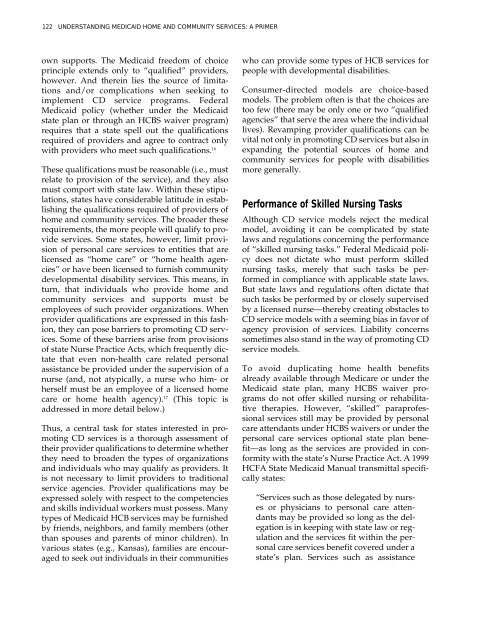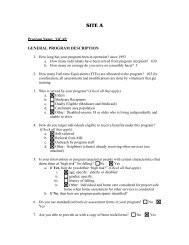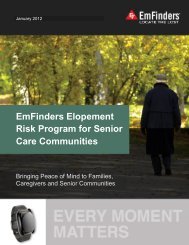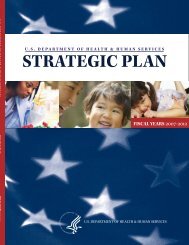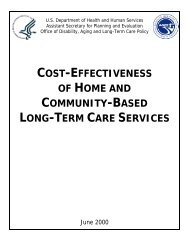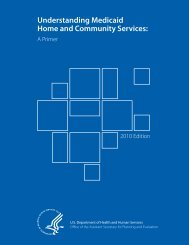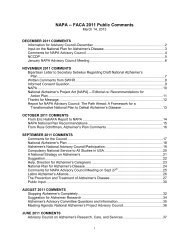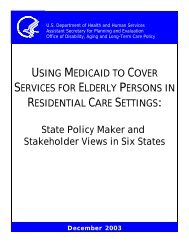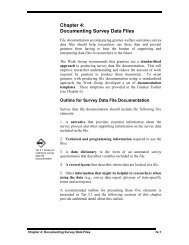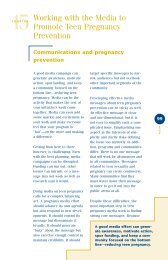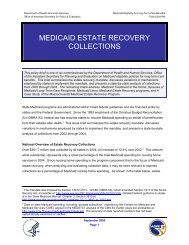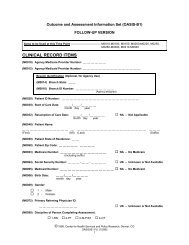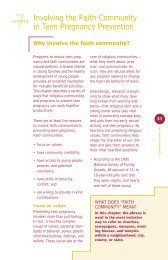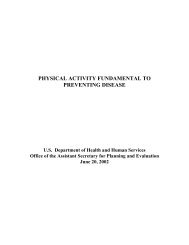Full PDF Version - ASPE - U.S. Department of Health and Human ...
Full PDF Version - ASPE - U.S. Department of Health and Human ...
Full PDF Version - ASPE - U.S. Department of Health and Human ...
- No tags were found...
Create successful ePaper yourself
Turn your PDF publications into a flip-book with our unique Google optimized e-Paper software.
122 UNDERSTANDING MEDICAID HOME AND COMMUNITY SERVICES: A PRIMERown supports. The Medicaid freedom <strong>of</strong> choiceprinciple extends only to “qualified” providers,however. And therein lies the source <strong>of</strong> limitations<strong>and</strong>/or complications when seeking toimplement CD service programs. FederalMedicaid policy (whether under the Medicaidstate plan or through an HCBS waiver program)requires that a state spell out the qualificationsrequired <strong>of</strong> providers <strong>and</strong> agree to contract onlywith providers who meet such qualifications. 16These qualifications must be reasonable (i.e., mustrelate to provision <strong>of</strong> the service), <strong>and</strong> they alsomust comport with state law. Within these stipulations,states have considerable latitude in establishingthe qualifications required <strong>of</strong> providers <strong>of</strong>home <strong>and</strong> community services. The broader theserequirements, the more people will qualify to provideservices. Some states, however, limit provision<strong>of</strong> personal care services to entities that arelicensed as “home care” or “home health agencies”or have been licensed to furnish communitydevelopmental disability services. This means, inturn, that individuals who provide home <strong>and</strong>community services <strong>and</strong> supports must beemployees <strong>of</strong> such provider organizations. Whenprovider qualifications are expressed in this fashion,they can pose barriers to promoting CD services.Some <strong>of</strong> these barriers arise from provisions<strong>of</strong> state Nurse Practice Acts, which frequently dictatethat even non-health care related personalassistance be provided under the supervision <strong>of</strong> anurse (<strong>and</strong>, not atypically, a nurse who him- orherself must be an employee <strong>of</strong> a licensed homecare or home health agency). 17 (This topic isaddressed in more detail below.)Thus, a central task for states interested in promotingCD services is a thorough assessment <strong>of</strong>their provider qualifications to determine whetherthey need to broaden the types <strong>of</strong> organizations<strong>and</strong> individuals who may qualify as providers. Itis not necessary to limit providers to traditionalservice agencies. Provider qualifications may beexpressed solely with respect to the competencies<strong>and</strong> skills individual workers must possess. Manytypes <strong>of</strong> Medicaid HCB services may be furnishedby friends, neighbors, <strong>and</strong> family members (otherthan spouses <strong>and</strong> parents <strong>of</strong> minor children). Invarious states (e.g., Kansas), families are encouragedto seek out individuals in their communitieswho can provide some types <strong>of</strong> HCB services forpeople with developmental disabilities.Consumer-directed models are choice-basedmodels. The problem <strong>of</strong>ten is that the choices aretoo few (there may be only one or two “qualifiedagencies” that serve the area where the individuallives). Revamping provider qualifications can bevital not only in promoting CD services but also inexp<strong>and</strong>ing the potential sources <strong>of</strong> home <strong>and</strong>community services for people with disabilitiesmore generally.Performance <strong>of</strong> Skilled Nursing TasksAlthough CD service models reject the medicalmodel, avoiding it can be complicated by statelaws <strong>and</strong> regulations concerning the performance<strong>of</strong> “skilled nursing tasks.” Federal Medicaid policydoes not dictate who must perform skillednursing tasks, merely that such tasks be performedin compliance with applicable state laws.But state laws <strong>and</strong> regulations <strong>of</strong>ten dictate thatsuch tasks be performed by or closely supervisedby a licensed nurse—thereby creating obstacles toCD service models with a seeming bias in favor <strong>of</strong>agency provision <strong>of</strong> services. Liability concernssometimes also st<strong>and</strong> in the way <strong>of</strong> promoting CDservice models.To avoid duplicating home health benefitsalready available through Medicare or under theMedicaid state plan, many HCBS waiver programsdo not <strong>of</strong>fer skilled nursing or rehabilitativetherapies. However, “skilled” parapr<strong>of</strong>essionalservices still may be provided by personalcare attendants under HCBS waivers or under thepersonal care services optional state plan benefit—aslong as the services are provided in conformitywith the state’s Nurse Practice Act. A 1999HCFA State Medicaid Manual transmittal specificallystates:“Services such as those delegated by nursesor physicians to personal care attendantsmay be provided so long as the delegationis in keeping with state law or regulation<strong>and</strong> the services fit within the personalcare services benefit covered under astate’s plan. Services such as assistance


